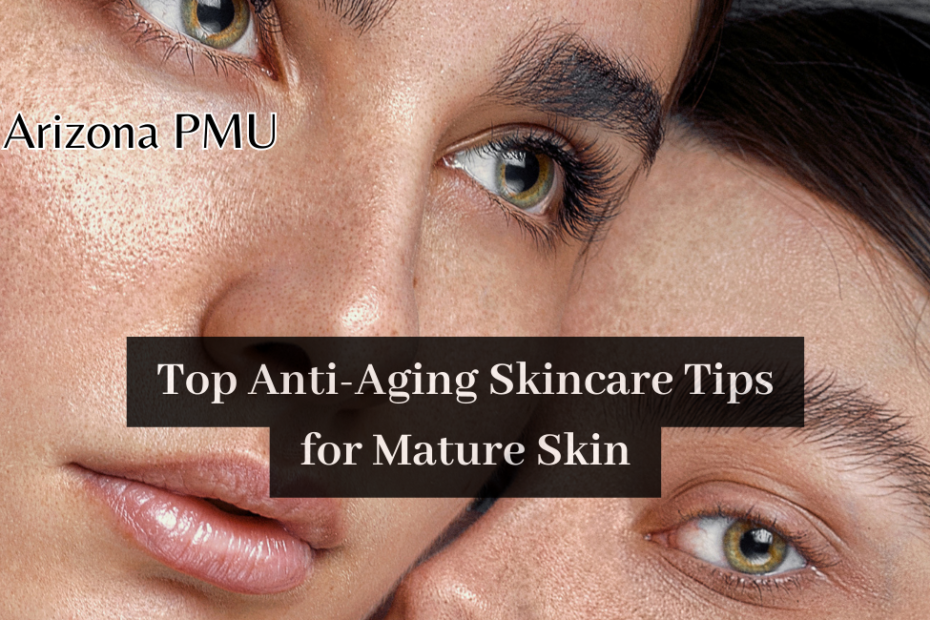Key healthy skincare practices are listed below to assist you in developing your anti-aging skincare regimen. Each of these suggestions is backed by years of research.
Taking care of your skin is important, especially as you get older. To effectively fight the effects of aging, mature skin needs specific care and a tailored skincare regimen. We’ll provide you with the best anti-aging skincare advice for older skin in this post, supported by dermatological knowledge and academic research.
1. Protect Your Skin from the Sun
Every skincare routine for anti-aging starts with sun protection. The sun’s rays can hasten the skin’s aging process, causing wrinkles, age spots, and other symptoms of early aging. Dermatologists advise you to use the following precautions to shield your skin from damaging UV rays:
- Seek Shade: When the sun’s rays are at their greatest, between 10 and 2 in the afternoon, seek shade. Additionally, if your shadow seems shorter than you are, attempt to find some shade. Your time spent in the sun will be reduced due to this.
- Cover Up Stylishly: Wear protective gear, such as a wide-brimmed hat, long sleeves, and pants to protect your skin from the sun. To minimize the appearance of fine lines and age spots on your hands and around your eyes, respectively, gloves and sunglasses are also crucial.
- Slather on Sunscreen: Every day before venturing outdoors, apply sunscreen. A broad-spectrum sunscreen with an SPF of 30 or higher is recommended. Be sure to protect your hands, neck, and any other exposed flesh. Apply sunscreen again every two hours after swimming and after sweating.
2. Forget About Indoor Tanning
Indoor tanning hastens the aging process by exposing your skin to damaging UV rays. Sun lamps and tanning beds can cause as much harm as the sun. To keep youthful and healthy-looking skin, never tan indoors.
3. Apply Moisturizer Every Day
Our skin gets drier as we age, making fine lines and wrinkles emerge. In order to preserve hydration and give the skin a healthy glow, moisturizers are essential. Follow these suggestions for the best outcomes:
- Facial Moisturizer: Use a face moisturizer of excellent quality made for aged skin. Hyaluronic acid, retinol, and peptides are good substances to look for since they can moisturize the skin and promote collagen synthesis. Apply the moisturizer twice daily, in the morning and just before night.
- Body Moisturizer: Don’t disregard your body’s skin. After bathing, moisturize your body with a nutritious product to seal in moisture and keep your skin soft and supple.
- Lip Balm: Dryness and small wrinkles can also affect your lips. To keep them moisturized and shield them from the sun’s harmful rays, apply lip balm with SPF.
Check out the web-based version of the popular Story
4. Wash Away Dirt and Grime Twice a Day
For skin to remain healthy and youthful-looking, proper washing is crucial. Use these recommendations when washing your face:
- Use Warm Water and Mild Cleanser: Use lukewarm water and a mild cleanser to wash your face. Avoid harsh soaps since they might dry up and irritate your skin by removing their natural oils.
- Avoid Scrubbing: When washing your face, be gentle and try not to scrub your skin too hard. Excessive rubbing can aggravate aging symptoms by causing irritation and inflammation.
5. Stop Smoking
Smoking has negative effects on your skin and frequently leads to a condition called “smoker’s face.” A dull, dry complexion, a loss of skin firmness, early lines and wrinkles, and leathery skin are all symptoms of smoking on the face. Giving up smoking can make a big difference in the condition and appearance of your skin.
6. Eat Healthy Foods
A nutritious and well-balanced diet is crucial for fostering healthy skin. Include the following foods in your meals every day:
- Fruits and Vegetables: Antioxidants, vitamins, and minerals found in fruits and vegetables are good for preventing free radical damage to the skin. Choose bright vegetables instead, such as bell peppers, berries, leafy greens, and citrus fruits.
- Lean Proteins: Eat a diet rich in lean proteins, such as chicken, fish, tofu, and lentils. These protein sources offer the crucial amino acids required for the synthesis of collagen, which fosters skin suppleness.
- Healthy Fats: Consume foods high in beneficial fats, such as olive oil, nuts, seeds, and avocados. These fats aid in nourishing your skin from the inside out, keeping it hydrated and plump.
7. Get Enough Sleep
The health of your skin and your entire well-being depend on getting enough sleep. Your body, especially your skin, renews and restores itself as you sleep. To sleep soundly at night, remember to:
- Establish a Bedtime Routine: Before bed, establish a calming habit of telling your body it’s time to unwind. Dim the lights, stay away from technology, and do something peaceful, like read a book or take a warm bath.
- Invest in a Quality Pillow and Mattress: Make sure your bedroom is a comfy place to sleep. Choose a mattress that fits your preferences and offers adequate spinal alignment, as well as a supportive pillow.
- Aim for 7-9 Hours of Sleep: Adults typically require 7-9 hours of restful sleep each night. Establish a sleep regimen that suits you and prioritize obtaining enough restorative sleep.
Conclusion
To keep your mature skin healthy and youthful-looking, you must take care of it. You may successfully fight the effects of aging and promote a youthful complexion by adhering to these best anti-aging skincare recommendations for older skin. Remember to use sunscreen, moisturize frequently, use gentle cleaning products, give up smoking, follow a healthy diet, and prioritize getting enough sleep. By implementing these behaviors into your skincare routine, you can have wholesome, radiant, and youthful-looking skin for many years.
Check out: Kylie Jenner’s New Naked Nails Are Here: Get Inspiration!
